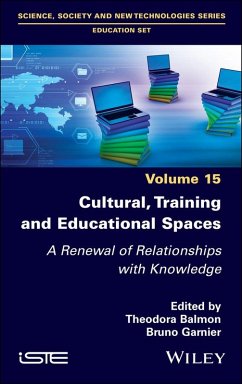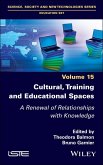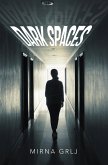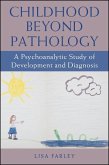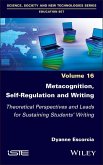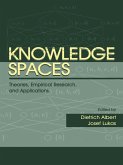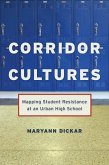Cultural, Training and Educational Spaces (eBook, ePUB)
A Renewal of Relationships with Knowledge
Redaktion: Balmon, Theodora; Garnier, Bruno


Alle Infos zum eBook verschenken

Cultural, Training and Educational Spaces (eBook, ePUB)
A Renewal of Relationships with Knowledge
Redaktion: Balmon, Theodora; Garnier, Bruno
- Format: ePub
- Merkliste
- Auf die Merkliste
- Bewerten Bewerten
- Teilen
- Produkt teilen
- Produkterinnerung
- Produkterinnerung

Hier können Sie sich einloggen

Bitte loggen Sie sich zunächst in Ihr Kundenkonto ein oder registrieren Sie sich bei bücher.de, um das eBook-Abo tolino select nutzen zu können.
For two centuries, the school system has been a central point around which other players have gravitated: local authorities, voluntary organizations and the world of work. Over the course of the 20th century, this school centric configuration underwent a transformation, with local authorities tending to become integrated into the vertical culture of the school system. This was only the beginning of a process that brought schools and socio cultural players into constant contact. Cultural, Training and Educational Spaces first examines the relationships with knowledge generated by the links…mehr
- Geräte: eReader
- mit Kopierschutz
- eBook Hilfe
- Größe: 2.06MB
![Cultural, Training and Educational Spaces (eBook, PDF) Cultural, Training and Educational Spaces (eBook, PDF)]() Cultural, Training and Educational Spaces (eBook, PDF)114,99 €
Cultural, Training and Educational Spaces (eBook, PDF)114,99 €![Psychomanagement (eBook, ePUB) Psychomanagement (eBook, ePUB)]() Robert SpillanePsychomanagement (eBook, ePUB)20,95 €
Robert SpillanePsychomanagement (eBook, ePUB)20,95 €![Dark Spaces (eBook, ePUB) Dark Spaces (eBook, ePUB)]() Mirna GrljDark Spaces (eBook, ePUB)3,99 €
Mirna GrljDark Spaces (eBook, ePUB)3,99 €![Childhood beyond Pathology (eBook, ePUB) Childhood beyond Pathology (eBook, ePUB)]() Lisa FarleyChildhood beyond Pathology (eBook, ePUB)28,95 €
Lisa FarleyChildhood beyond Pathology (eBook, ePUB)28,95 €![Metacognition, Self-Regulation and Writing (eBook, ePUB) Metacognition, Self-Regulation and Writing (eBook, ePUB)]() Dyanne EscorciaMetacognition, Self-Regulation and Writing (eBook, ePUB)142,99 €
Dyanne EscorciaMetacognition, Self-Regulation and Writing (eBook, ePUB)142,99 €![Knowledge Spaces (eBook, ePUB) Knowledge Spaces (eBook, ePUB)]() Knowledge Spaces (eBook, ePUB)56,95 €
Knowledge Spaces (eBook, ePUB)56,95 €![Corridor Cultures (eBook, ePUB) Corridor Cultures (eBook, ePUB)]() Maryann DickarCorridor Cultures (eBook, ePUB)26,95 €
Maryann DickarCorridor Cultures (eBook, ePUB)26,95 €-
-
-
Dieser Download kann aus rechtlichen Gründen nur mit Rechnungsadresse in A, B, BG, CY, CZ, D, DK, EW, E, FIN, F, GR, HR, H, IRL, I, LT, L, LR, M, NL, PL, P, R, S, SLO, SK ausgeliefert werden.
- Produktdetails
- Verlag: John Wiley & Sons
- Seitenzahl: 320
- Erscheinungstermin: 4. Dezember 2023
- Englisch
- ISBN-13: 9781394255405
- Artikelnr.: 69661053
- Verlag: John Wiley & Sons
- Seitenzahl: 320
- Erscheinungstermin: 4. Dezember 2023
- Englisch
- ISBN-13: 9781394255405
- Artikelnr.: 69661053
- Herstellerkennzeichnung Die Herstellerinformationen sind derzeit nicht verfügbar.
Introduction xvii
Bruno Garnier and Theodora Balmon
Part 1 The Cultural Spaces of Knowledge 1
Introduction to Part 1 3
Régis Malet
Chapter 1 Local Educational Community and New Knowledge Sharing 5
Sylvie Condette
1.1 Working together: local resources to mobilize 6
1.1.1 General context of the action 7
1.1.2 Personalizing the relationship: a useful first step, but not enough 8
1.1.3 Open and strengthened consultation, at the service of families and
children 9
1.2 Collaboration in action: initiating new know-how 10
1.2.1 Joint actions 10
1.2.2 Continuous redefinition of objectives and activities 11
1.2.3 Change of mindset and values to promote 12
1.3 Effects of collaborative work 13
1.3.1. Effects in terms of categorical rapprochement and
interprofessionality 13
1.3.2 Systemic effects on the environment 15
1.4 Conclusion: towards the construction of a local educational community
15
1.5 References 16
Chapter 2 Expanding Roles for Community Institutions: US Public Libraries
as Community Health Partners 19
Mary Grace Flaherty
2.1 Background 19
2.2 US public libraries and health 21
2.3 Shifting missions and responsibilities 21
2.3.1 Health information providers 22
2.3.2 Pandemic response 23
2.3.3 Seizing opportunities 24
2.4 Final thoughts 26
2.5 References 26
Chapter 3 Regarding the School Form: Critical Reflections 29
Pierre Kahn
3.1 Thinking about the school form 29
3.2 Historicity of the school form 30
3.3 Transhistorical continuity 34
3.4 School form and democratic form of socialization, historicity versus
continuity? 36
3.5 Conclusion: the concept of school form, a useful concept? 37
3.6 References 38
Part 2 Museums and the School Form: What are the Interactions? 41
Introduction to Part 2 43
Anik Meunier
Chapter 4. The Transmission of Technical Culture in France in the 19th
Century via Collections of Objects 49
Géraldine Barron
4.1 Crossed histories 50
4.2 Conservatoire des arts et métiers 50
4.3 Musée naval 52
4.4 Collections and audiences: outline of a differentiated transmission 54
4.5 Conclusion 58
4.6 References 60
Chapter 5 The Musée de la Corse and the Citadelle de Corte, Experimentation
of Museum Mediation in the Service of a Shared Future 63
Marion Trannoy Voisin
5.1 Museum geography in Central Corsica 63
5.2 Landscape inscription 65
5.3 Change of destination 68
5.4 Patrimonial territory 69
5.5 Impacts 72
5.6 Example of active and citizen museology 73
5.7 References 75
Chapter 6 Institutionalization of Passion Instead of Competence 77
Nathanaël Wadbled
6.1 Introduction: leave your pupils to a guide 77
6.1.1 Guides' response to teachers' demands 77
6.1.2 Method and fieldwork: participant observation in a tourist office 78
6.2 Competence of the guides in addition to that of the historians 80
6.2.1 Extracurricular practice of a patrimonial space 80
6.2.2 Guiding to make people see and understand 82
6.3 Passing an anti-scientific discourse on history 83
6.3.1 Replacing the historical discourse with another 83
6.3.2 Misunderstanding with teachers 85
6.4 Institutionalization of passion instead of competence 86
6.4.1 Passion as the praxis of history 86
6.4.2 Critical thinking as respect for tradition 87
6.4.3 An organization that favors an anti-historical practice 88
6.5 Conclusion: visiting a place of history in an age of mistrust of
science 90
6.6 References 91
Chapter 7 The Contribution of Museums in Non-formal Education and Cultural
Transmission 95
Anik Meunier and Camille Roelens
7.1 Places of autonomy and hypermodern mediations 97
7.1.1 Resources of individual autonomy, or matter of mediation 98
7.1.2 Benevolent authority, or the way of mediation 99
7.2 Teachers: mediators in search of appropriate mediations? 100
7.3 Conclusion 103
7.4 References 105
Chapter 8 Cultural Space, Digitization and Training in the Museum 109
Corinne Baujard
8.1 Context of the case study 110
8.2 Presentation of the experimental project at the museum 111
8.2.1 First report: enriching the museum's relationship with its school
audience 111
8.2.2 Second report: preparing the school visit with the teachers 112
8.2.3 Third report: art education and aesthetic relationships to art
training with digital devices offered to pupils in the exhibition space 114
8.2.4 Fourth report: the museum's organization 116
8.3 References 118
Part 3 Reading and Cultural Mediation 121
Introduction to Part 3 123
Denise Gisele De Britto Damasco
Chapter 9 Developing New Teaching Practices for Reading and Writing in
French Elementary Schools Involving Book Mediators 127
Nathalie Bertrand
9.1 What professional skills are expected? 127
9.2 State of the art in initial training 128
9.3 Cultural mediation practices in the master's program 130
9.4 Looking back on the experience: the students' point of view 132
9.5 New innovative pedagogical device to be tested: Fabulathèque 134
9.6 Appendix 135
9.7 References 137
Chapter 10 Making Books Resonate: A Cultural Mediation Exercise Offered to
Trainee Schoolteachers 139
Pascale Gossin and Isabelle Lebrat
10.1 Reading aloud in literature 139
10.1.1 Jean-Jacques Rousseau and fellowship 140
10.1.2 Émile Zola and the social gaze 140
10.1.3 Jean-Paul Sartre and the entrance into reading 140
10.2 School practice 141
10.2.1 Past school practice 141
10.2.2 Current school practice 143
10.3 Putting in resonance 144
10.3.1 Reasons for choosing the module 145
10.3.2 Difference between foresight and reality 145
10.3.3 Role of the schoolteacher 145
10.3.4 Professional contributions 145
10.3.5 Challenges 146
10.4 Conclusion 146
10.5 References 147
Part 4 Informal Learning, Formal Learning, Hybrid Training 151
Introduction to Part 4 153
Sylvie Condette
Chapter 11 Informal Adult Learning in Libraries: Between School Form and
Popular Education? 159
Theodora Balmon
11.1 Library between school form and popular education 161
11.1.1 In the filter of the school form 161
11.1.2 Legacy of popular education 162
11.1.3 Informal learning 163
11.2 Methodology of the narrative survey 164
11.2.1 Comprehensive paradigm 165
11.2.2 Sample and exploratory interviews 165
11.3 Findings 166
11.3.1 Profile of survey participants 166
11.3.2 Formal/informal duality 167
11.3.3 Types of learning identified in the interviews 167
11.3.4 Exchanges and socialization 168
11.4 Discussion and conclusion 169
11.5 References 170
Chapter 12 The Construction of Boundary Objects: A Lever for the
Transformation of the University Form 173
Rana Challah and Geneviève Lameul
12.1 Introduction: higher education at the heart of change 173
12.2 Projet DESIR: contextual elements 174
12.3 Theoretical framework 175
12.4 Methodology 178
12.5 Research findings and highlights 178
12.5.1 First stage of the project: the co-situation 178
12.5.2 Second stage of the project: cooperation 180
12.5.3 Third stage of the project: co-production 181
12.6 Discussion and conclusion 182
12.7 References 184
Chapter 13 Cultural, Curricular and Axiological Challenges of Training for
the Education Profession in the Era of Globalization 189
Régis Malet and Martine Derivry-Plard
13.1 Introduction: the challenges of education and training in a globalized
world 189
13.2 Educating and training in a multilingual and multicultural world 190
13.2.1 Education, training and languages: a heuristic alliance for the
training of educators in a globalized world 191
13.2.2 Dynamics of languages and disciplines contributing to training 193
13.2.3 Plurilingual training and promotion of human diversity in education
194
13.3 Training trainers for democratic education 196
13.3.1 Content and value challenges for the promotion of intellectuals in
action 196
13.3.2 Cultural and curricular challenges in the production of
transformative knowledge that promotes professional and civic commitment
199
13.4 Conclusion: a plurilingual and pluricultural paradigm in teacher and
trainer training to meet the democratic challenges of globalization 202
13.5 References 204
Chapter 14 The Emergence of Patrimonial Education in the Arganeraie
Biosphere Reserve (ABR) in Morocco 211
Salma Itsmaïl
14.1 History of the school form 212
14.2 Introduction of patrimonial education in the Moroccan school system
213
14.2.1 Learning languages 213
14.2.2 Citizenship education 213
14.2.3 Self-directed learning 214
14.2.4 Environmental education 214
14.3 Poorly integrated patrimonial education 214
14.3.1 Degree of patrimonial knowledge among pupils in Marrakech 216
14.3.2 Degree of patrimonial knowledge among pupils in Agadir 216
14.4 New school form to be tested 217
14.4.1 Experience at the heart of learning 220
14.5 Discussion 221
14.6 References 222
Conclusion 225
Theodora Balmon and Bruno Garnier
Appendix 241
Alain Jaillet
Postface 255
Maurice Tardif¿
List of Authors 263
Index 265
Introduction xvii
Bruno Garnier and Theodora Balmon
Part 1 The Cultural Spaces of Knowledge 1
Introduction to Part 1 3
Régis Malet
Chapter 1 Local Educational Community and New Knowledge Sharing 5
Sylvie Condette
1.1 Working together: local resources to mobilize 6
1.1.1 General context of the action 7
1.1.2 Personalizing the relationship: a useful first step, but not enough 8
1.1.3 Open and strengthened consultation, at the service of families and
children 9
1.2 Collaboration in action: initiating new know-how 10
1.2.1 Joint actions 10
1.2.2 Continuous redefinition of objectives and activities 11
1.2.3 Change of mindset and values to promote 12
1.3 Effects of collaborative work 13
1.3.1. Effects in terms of categorical rapprochement and
interprofessionality 13
1.3.2 Systemic effects on the environment 15
1.4 Conclusion: towards the construction of a local educational community
15
1.5 References 16
Chapter 2 Expanding Roles for Community Institutions: US Public Libraries
as Community Health Partners 19
Mary Grace Flaherty
2.1 Background 19
2.2 US public libraries and health 21
2.3 Shifting missions and responsibilities 21
2.3.1 Health information providers 22
2.3.2 Pandemic response 23
2.3.3 Seizing opportunities 24
2.4 Final thoughts 26
2.5 References 26
Chapter 3 Regarding the School Form: Critical Reflections 29
Pierre Kahn
3.1 Thinking about the school form 29
3.2 Historicity of the school form 30
3.3 Transhistorical continuity 34
3.4 School form and democratic form of socialization, historicity versus
continuity? 36
3.5 Conclusion: the concept of school form, a useful concept? 37
3.6 References 38
Part 2 Museums and the School Form: What are the Interactions? 41
Introduction to Part 2 43
Anik Meunier
Chapter 4. The Transmission of Technical Culture in France in the 19th
Century via Collections of Objects 49
Géraldine Barron
4.1 Crossed histories 50
4.2 Conservatoire des arts et métiers 50
4.3 Musée naval 52
4.4 Collections and audiences: outline of a differentiated transmission 54
4.5 Conclusion 58
4.6 References 60
Chapter 5 The Musée de la Corse and the Citadelle de Corte, Experimentation
of Museum Mediation in the Service of a Shared Future 63
Marion Trannoy Voisin
5.1 Museum geography in Central Corsica 63
5.2 Landscape inscription 65
5.3 Change of destination 68
5.4 Patrimonial territory 69
5.5 Impacts 72
5.6 Example of active and citizen museology 73
5.7 References 75
Chapter 6 Institutionalization of Passion Instead of Competence 77
Nathanaël Wadbled
6.1 Introduction: leave your pupils to a guide 77
6.1.1 Guides' response to teachers' demands 77
6.1.2 Method and fieldwork: participant observation in a tourist office 78
6.2 Competence of the guides in addition to that of the historians 80
6.2.1 Extracurricular practice of a patrimonial space 80
6.2.2 Guiding to make people see and understand 82
6.3 Passing an anti-scientific discourse on history 83
6.3.1 Replacing the historical discourse with another 83
6.3.2 Misunderstanding with teachers 85
6.4 Institutionalization of passion instead of competence 86
6.4.1 Passion as the praxis of history 86
6.4.2 Critical thinking as respect for tradition 87
6.4.3 An organization that favors an anti-historical practice 88
6.5 Conclusion: visiting a place of history in an age of mistrust of
science 90
6.6 References 91
Chapter 7 The Contribution of Museums in Non-formal Education and Cultural
Transmission 95
Anik Meunier and Camille Roelens
7.1 Places of autonomy and hypermodern mediations 97
7.1.1 Resources of individual autonomy, or matter of mediation 98
7.1.2 Benevolent authority, or the way of mediation 99
7.2 Teachers: mediators in search of appropriate mediations? 100
7.3 Conclusion 103
7.4 References 105
Chapter 8 Cultural Space, Digitization and Training in the Museum 109
Corinne Baujard
8.1 Context of the case study 110
8.2 Presentation of the experimental project at the museum 111
8.2.1 First report: enriching the museum's relationship with its school
audience 111
8.2.2 Second report: preparing the school visit with the teachers 112
8.2.3 Third report: art education and aesthetic relationships to art
training with digital devices offered to pupils in the exhibition space 114
8.2.4 Fourth report: the museum's organization 116
8.3 References 118
Part 3 Reading and Cultural Mediation 121
Introduction to Part 3 123
Denise Gisele De Britto Damasco
Chapter 9 Developing New Teaching Practices for Reading and Writing in
French Elementary Schools Involving Book Mediators 127
Nathalie Bertrand
9.1 What professional skills are expected? 127
9.2 State of the art in initial training 128
9.3 Cultural mediation practices in the master's program 130
9.4 Looking back on the experience: the students' point of view 132
9.5 New innovative pedagogical device to be tested: Fabulathèque 134
9.6 Appendix 135
9.7 References 137
Chapter 10 Making Books Resonate: A Cultural Mediation Exercise Offered to
Trainee Schoolteachers 139
Pascale Gossin and Isabelle Lebrat
10.1 Reading aloud in literature 139
10.1.1 Jean-Jacques Rousseau and fellowship 140
10.1.2 Émile Zola and the social gaze 140
10.1.3 Jean-Paul Sartre and the entrance into reading 140
10.2 School practice 141
10.2.1 Past school practice 141
10.2.2 Current school practice 143
10.3 Putting in resonance 144
10.3.1 Reasons for choosing the module 145
10.3.2 Difference between foresight and reality 145
10.3.3 Role of the schoolteacher 145
10.3.4 Professional contributions 145
10.3.5 Challenges 146
10.4 Conclusion 146
10.5 References 147
Part 4 Informal Learning, Formal Learning, Hybrid Training 151
Introduction to Part 4 153
Sylvie Condette
Chapter 11 Informal Adult Learning in Libraries: Between School Form and
Popular Education? 159
Theodora Balmon
11.1 Library between school form and popular education 161
11.1.1 In the filter of the school form 161
11.1.2 Legacy of popular education 162
11.1.3 Informal learning 163
11.2 Methodology of the narrative survey 164
11.2.1 Comprehensive paradigm 165
11.2.2 Sample and exploratory interviews 165
11.3 Findings 166
11.3.1 Profile of survey participants 166
11.3.2 Formal/informal duality 167
11.3.3 Types of learning identified in the interviews 167
11.3.4 Exchanges and socialization 168
11.4 Discussion and conclusion 169
11.5 References 170
Chapter 12 The Construction of Boundary Objects: A Lever for the
Transformation of the University Form 173
Rana Challah and Geneviève Lameul
12.1 Introduction: higher education at the heart of change 173
12.2 Projet DESIR: contextual elements 174
12.3 Theoretical framework 175
12.4 Methodology 178
12.5 Research findings and highlights 178
12.5.1 First stage of the project: the co-situation 178
12.5.2 Second stage of the project: cooperation 180
12.5.3 Third stage of the project: co-production 181
12.6 Discussion and conclusion 182
12.7 References 184
Chapter 13 Cultural, Curricular and Axiological Challenges of Training for
the Education Profession in the Era of Globalization 189
Régis Malet and Martine Derivry-Plard
13.1 Introduction: the challenges of education and training in a globalized
world 189
13.2 Educating and training in a multilingual and multicultural world 190
13.2.1 Education, training and languages: a heuristic alliance for the
training of educators in a globalized world 191
13.2.2 Dynamics of languages and disciplines contributing to training 193
13.2.3 Plurilingual training and promotion of human diversity in education
194
13.3 Training trainers for democratic education 196
13.3.1 Content and value challenges for the promotion of intellectuals in
action 196
13.3.2 Cultural and curricular challenges in the production of
transformative knowledge that promotes professional and civic commitment
199
13.4 Conclusion: a plurilingual and pluricultural paradigm in teacher and
trainer training to meet the democratic challenges of globalization 202
13.5 References 204
Chapter 14 The Emergence of Patrimonial Education in the Arganeraie
Biosphere Reserve (ABR) in Morocco 211
Salma Itsmaïl
14.1 History of the school form 212
14.2 Introduction of patrimonial education in the Moroccan school system
213
14.2.1 Learning languages 213
14.2.2 Citizenship education 213
14.2.3 Self-directed learning 214
14.2.4 Environmental education 214
14.3 Poorly integrated patrimonial education 214
14.3.1 Degree of patrimonial knowledge among pupils in Marrakech 216
14.3.2 Degree of patrimonial knowledge among pupils in Agadir 216
14.4 New school form to be tested 217
14.4.1 Experience at the heart of learning 220
14.5 Discussion 221
14.6 References 222
Conclusion 225
Theodora Balmon and Bruno Garnier
Appendix 241
Alain Jaillet
Postface 255
Maurice Tardif¿
List of Authors 263
Index 265
